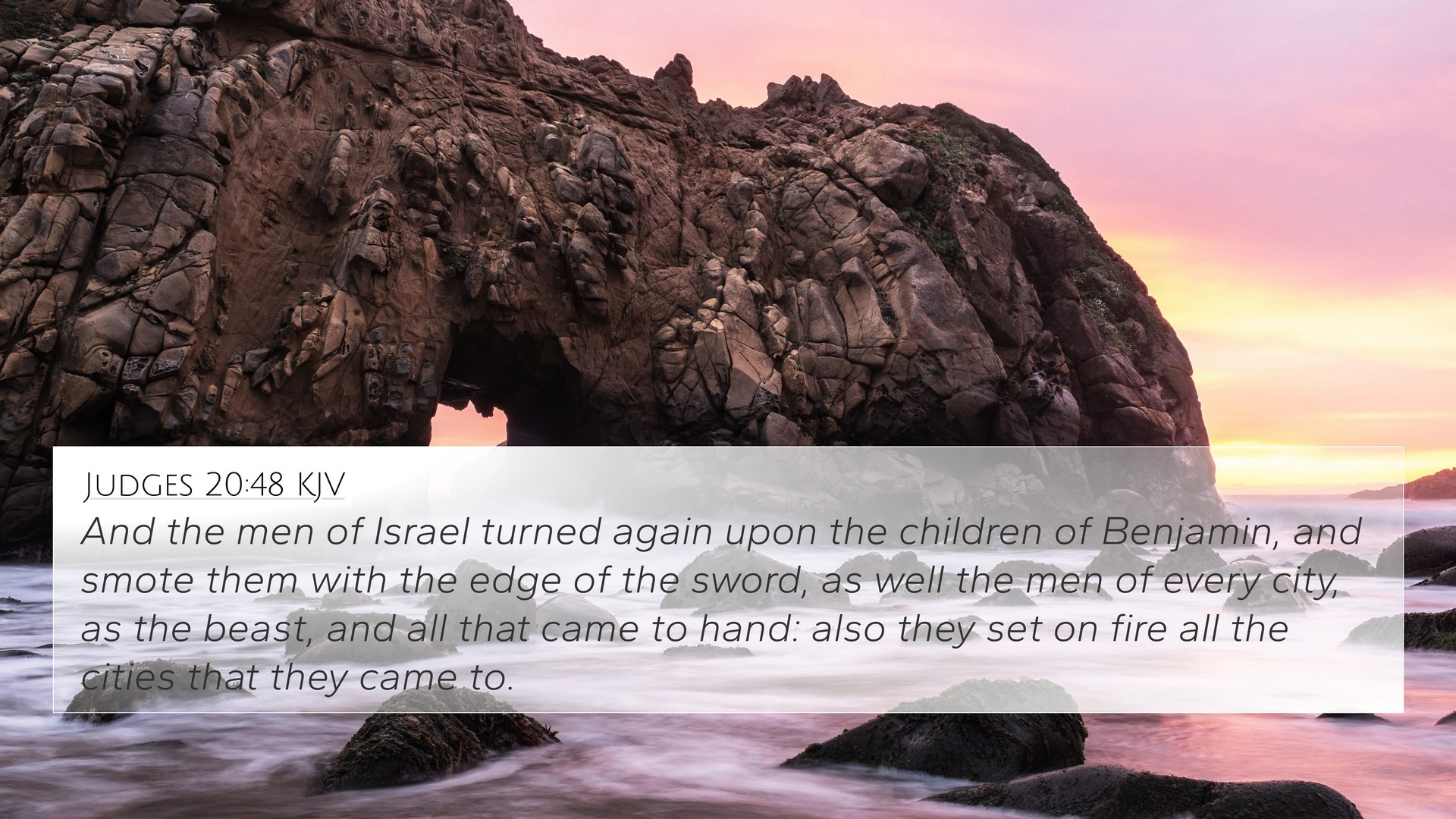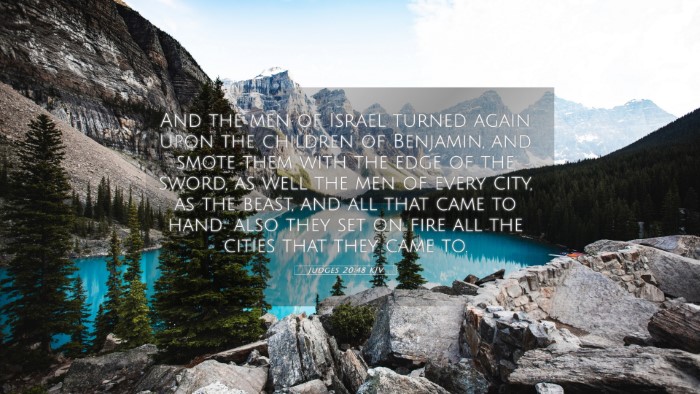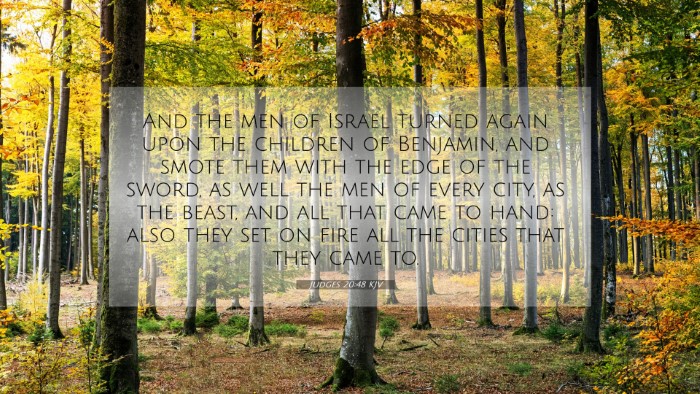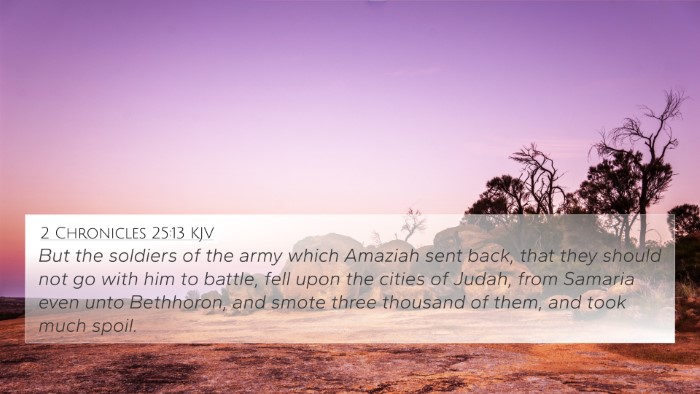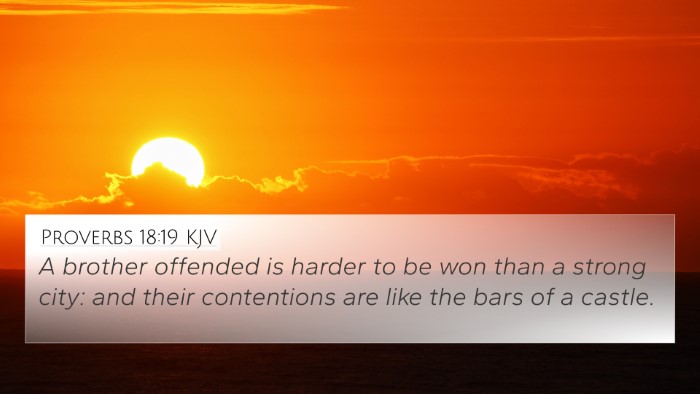Bible Verse Meaning: Judges 20:48
Verse Context: Judges 20:48 recounts a significant event in the narrative of the Israelite tribes as they respond to the immorality in Gibeah, a town in the tribe of Benjamin. Following a war against Benjamin, the Israelites vent their wrath upon the inhabitants of the city.
Summary of Judges 20:48
This verse depicts the aftermath of a conflict where the Israelite coalition attacked Gibeah—resulting in a comprehensive destruction of the city and its resources. The phrase captures the intensity of their defeat and the seriousness of the moral decline represented by Gibeah in their eyes. The passage serves as a judgment on sin, a call to communal violence in the name of justice, and the consequences of societal corruption.
Key Insights from Commentaries
Insights drawn from public domain commentaries such as those by Matthew Henry, Albert Barnes, and Adam Clarke offer a deeper understanding:
- Matthew Henry: Emphasizes the grave sin of Gibeah, connecting it to the overall theme of divine retribution. He notes how this passage highlights the people's pursuit of justice, albeit through violence, showing the cycle of sin and consequence.
- Albert Barnes: Points out that the events reflect a larger narrative of God’s judgment upon Israel for their disobedience. Gibeah serves as a microcosm of Israel's spiritual decay and the dire need for repentance.
- Adam Clarke: Discusses the implications of the actions taken by the tribes of Israel and the importance of unity in confronting evil. He reflects on the necessity of collective moral action and the ramifications of straying from God’s commandments.
Related Bible Cross References
- Genesis 19:4-5 - The wickedness in Sodom as a parallel to the immorality found in Gibeah.
- Deuteronomy 13:12-16 - Instructions on dealing with sin within Israelite cities.
- Judges 19:22-30 - The precursor events leading to the conflict with Gibeah.
- 1 Samuel 11:1 - The similar theme of united Israel against a common foe.
- Romans 1:26-27 - New Testament reflection on the consequences of moral decay.
- 1 Corinthians 5:6-14 - Paul’s exhortation to remove evil among the community.
- Hebrews 10:26-31 - A warning about the consequences of willful sin.
Thematic Connections
Judges 20:48 is significant in several themes across the Bible:
- Divine Judgment: Cautions against moral corruption as demonstrated in the destruction of Gibeah.
- The Call for Justice: Highlights the necessity of retribution in the face of evil.
- Unity among Believers: Stresses the need for collective action against sin as seen in the united tribes.
- Repentance and Return: Indicates that a return to God is necessary for true justice and healing.
Cross-Referencing Biblical Texts
The method of cross-referencing within the Bible allows for a deeper exploration of themes and concepts, showcasing how Old and New Testament narratives intersect.
Tools for Bible Cross-Referencing
Utilizing resources like a Bible concordance aids in identifying connections between verses. Consider the following methods:
- Bible Cross-Reference Guide: A practical tool for finding related scriptures.
- Bible Chain References: Tracking themes across various books.
- Comparative Study: Engaging in a detailed analysis of similar narratives.
User Intent Keywords
When studying Judges 20:48, consider questions such as:
- What verses are related to Judges 20:48?
- How do Judges 19 and Judges 20 connect?
- Which Bible verses support the findings in Judges 20:48?
Conclusion
Judges 20:48 serves as a vivid reminder of the consequences of sin within a community, the necessity of justice, and the complexities involved in maintaining moral standards. By examining the connections between this verse and others through cross-referencing, believers can gain a comprehensive understanding of biblical justice and divine retribution.
